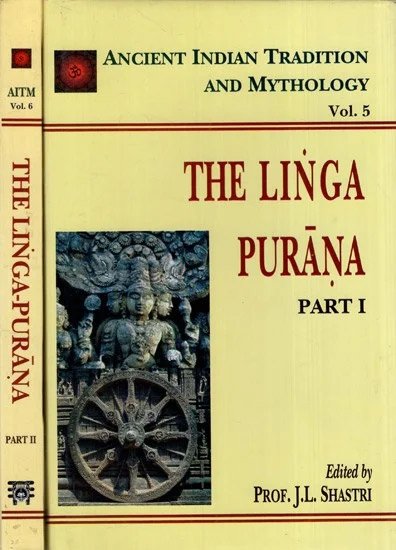The Linga Purana
by J. L. Shastri | 1951 | 265,005 words | ISBN-10: 812080340X | ISBN-13: 9788120803404
This page describes The greatness of Shiva which is chapter 17 of the English translation of the Linga Purana, traditionally authored by Vyasa in roughly 11,000 Sanskrit verses. It deals with Shaiva pilosophy, the Linga (symbol of Shiva), Cosmology, Yugas, Manvantaras, Creation theories, mythology, Astronomy, Yoga, Geography, Sacred pilgrimage guides (i.e., Tirthas) and Ethics. The Lingapurana is an important text in Shaivism but also contains stories on Vishnu and Brahma.
Chapter 17 - The greatness of Śiva
Sanatkumāra said:
1-3. Once again, O most excellent one among Devas, let me hear the greatness of Śiva. I am not satiated by listening to the excellent greatness of Śiva. I am not satisfied fully with your present nectarine speech.
How did the lord become an embodied soul? Wherefore is Rudra powerful and strong? How is he considered the Atman of all? How is the holy rite Pāśupata to be performed. How was Śaṅkara listened to by the chiefs of Devas? How was he delighted?
Śailādi said:
Sthāṇu, Śiva, the great cause originated from the unmanifest.
4-5. He was a lordly sage superior to the universe. He was the sage equipped with all causes. At the outset, he saw Brahmā, the first[1] Deva born out of his lotus-face. He glanced at him by way of command.[2] On being seen by Rudra, he, the lord of Devas, created everything.
6-7. The Virāj (immense Being) established the order of the castes and stages of life. For the sake of sacrifice, he created the soma juice. All these originated from the soma juice: the sacrificial offering, fire, sacrifice, lord Indra the consort of Śacī armed with the thunderbolt, Viṣṇu, Nārāyaṇa the glorious being and the entire earth identical with soma.
8-9. Devas eulogised lord Rudra by reciting the Rudrādhyāya. The lord stood in the midst of Devas with his face beaming with pleasure. It was as though the great lord took away their wisdom.
Devas then asked lord Śaṅkara, “Sir, who are you?”[3]
10. Lord Rudra said:—“O excellent Devas, I was the sole ancient Being. I continue to be the first among all beings.
11. I will be so in this world. There is nothing other than myself. There is nothing separate from me.[4] O excellent Devas, there is nothing else.
12. I am both eternal and non-eternal. I am the sinless Brahmā as also the lord of Brahmā. I am the quarters as well as the intermediary direction. I am Prakṛti as well as Puruṣa.
13. I am Triṣṭup, Jagatī and Anuṣṭup metres of prosody. I am the omnipresent Truth, the tranquil one. I am the threefold sacrificial fire. I am the preceptor as well as preceptorhood.
14. I am the cow. I am the cavity. I am always perceptible in the impenetrable depth. I am the eldest and best of all the principles. I am the lord of the waters.
15. I am the waters; lord Īśa; fiery brilliance, the sacrificial altar; I am the Ṛgveda, the Yajurveda, the Sāmaveda. I am the self-born deity.[5]
16. I am the Atharvaveda, the mantra, the most excellent among the Aṅgiras. I am the Itihāsa, the Purāṇa; the Kalpa[6] (science of Rituals) as well as the Kalpanā (imagination).
17. I am the imperishable and perishable; I am forgiveness, calmness, forbearance, the secret of all the Vedas, the most excellent and the unborn one.
18. I am the holy Puṣkara. I am the middle and beyond it. I am the exterior and interior. I am the unchanging one in front.
19. I am the brilliant light as well as darkness. I am Brahmā, Viṣṇu and Maheśvara. I am the cosmic intellect, ego, subtle elements and the sense-organs.
20. O excellent Devas, he who knows everything to be myself, is alone omniscient,[7] Parameśvara, the soul of all.
21-22. O excellent Devas, by means of my brilliance, I propitiate the cow by means of the cows; the brahmins by means of the brahminical power; longevity and offerings by means of longevity; truth by means of truth[8] and Dharma by means of Dharma. I propitiate all by my own brilliance.
After saying this at the outset, the lord vanished there itself.
23-24. Thereupon, Devas did not see lord Rudra. Including Nārāyaṇa and Indra, Devas and sages meditated upon him who was the greatest Ātman and the greatest cause. With their arms raised up, they praised and propitiated him.
Footnotes and references:
[1]:
davānām praṃamaṃ devam. Taittirīya Āraṇyaka. 10. 10. 3. Mahānārāyaṇa Upaniṣad 10.3.
[2]:
ājñayā—pāramaiśvaryā Śivatoṣiṇī. Cf. tasyājñā pārameśvarī—cited in sr.
[3]:
[4]:
Read matto for bhakto.
[5]:
[6]:
